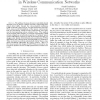129
Voted
CONEXT
2009
ACM
15 years 3 months ago
2009
ACM
Dense, unmanaged 802.11 deployments tempt saboteurs into launching jamming attacks by injecting malicious interference. Nowadays, jammers can be portable devices that transmit int...
145
click to vote
NETWORKING
2008
15 years 4 months ago
2008
In this paper, we apply evolutionary games to non-cooperative power control in wireless networks. Specifically, we focus our study in a power control in W-CDMA and WIMAX wireless s...
101
click to vote
IMC
2007
ACM
15 years 4 months ago
2007
ACM
A wide range of transmit power control (TPC) algorithms have been proposed in recent literature to reduce interference and increase capacity in 802.11 wireless networks. However, ...
152
click to vote
ICC
2007
IEEE
15 years 6 months ago
2007
IEEE
In this paper, the problem about power control in multiuser cognitive networks is addressed. The scenario we study is a heterogeneous network, where multiple cognitive (without the...
114
Voted
INFOCOM
1999
IEEE
15 years 6 months ago
1999
IEEE
: A Kalman-filter method for power control is proposed for broadband, packet-switched TDMA wireless networks. By observing the temporal correlation of cochannel interference when t...
133
click to vote
INFOCOM
2000
IEEE
15 years 7 months ago
2000
IEEE
—We address the issue of power-controlled shared channel access in future wireless networks supporting packetized data traffic, beyond the voice-oriented continuous traffic prima...
122
click to vote
CDC
2009
IEEE
15 years 7 months ago
2009
IEEE
— This paper investigates design of noncooperative games from a control theoretic perspective. Pricing mechanisms are used as a design tool to ensure that the Nash equilibrium of...
141
Voted
INFOCOM
2002
IEEE
15 years 7 months ago
2002
IEEE
—In this paper, we introduce a cross-layer design framework to the multiple access problem in contention-based wireless ad hoc networks. The motivation for this study is twofold,...
110
Voted
ICDCSW
2003
IEEE
15 years 7 months ago
2003
IEEE
We present an integrated dual approach to reduce power consumption in infrastructure-mode 802.11 wireless LANs. A novel distributed power control algorithm adaptively adjusts the ...
122
click to vote
WOWMOM
2005
ACM
15 years 8 months ago
2005
ACM
— This paper presents the ALCA (Asymmetric Link Collision Avoidance) protocol. ALCA was designed to deal with a known deficiency of the Basic Scheme [1] for power control in 802...

